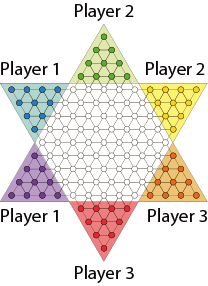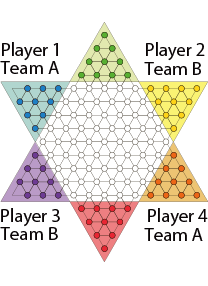How to Play Chinese Checkers
Equipment
The board’s playing field takes the form of a 6 point star. Each point of the star is a triangle with 10 holes that corresponds to a player’s starting point, where 10 matching colored marbles are placed. The triangle directly opposite the player (the opposing triangle) is known as the player’s home.

Preparation
Chinese Checkers can be played by 2 to 6 players.
Two players
Each player controls one to three sets of marbles.
Two players - Each player controls one to three sets of marbles.
1) If one set is used, players start in a triangle facing their opponent’s triangle.

2) If two sets are used, the players set up in two triangles facing the opponent’s two triangles, or one triangle opposing the opponent and one facing an empty triangle.


3) If three sets are used, each player places their marbles in three opposing triangles.

Three players
Each player controls one or two sets of marbles.
1) If one set is used, players set up in a triangle, facing an empty triangle.

2) If two sets are used, each player starts with two sets of colored marbles placed on opposing triangles.

Four players
Each player occupies one triangle.
1) In “free for all”, two opposite triangles are left empty.

2) If teams are played, two teams are formed and each player is set up on the opposite triangle of their teammate.

Six players
Each player controls one triangle
1) In “free for all”, each player sets up in their own triangle.

2) If teams are played, three teams of two players are established. Each player is set up on the opposite triangle of their teammate.

Objective
The aim of the game is to be the first player to move all their pieces across the board and into the opposing triangle, which becomes their home. When playing in teams, both team members must successfully move all their pieces across the board to their respective homes to win.
Movement
A coin toss determines who takes the first turn.
Players take turns moving their pieces across the board. During a player’s turn, they can move their piece to any adjacent empty hole.

A player’s piece can also hop over an adjacent piece, into an empty hole. That piece can be their own colored piece, or any other player's. The player may continue hopping over multiple pieces in any direction during a single turn, as long as there are empty holes on the other side of those pieces.

Let the race home begin!
Shop for a Chinese Checkers Set
Version 2-25
© 2025 Yellow Mountain Imports, Inc.

